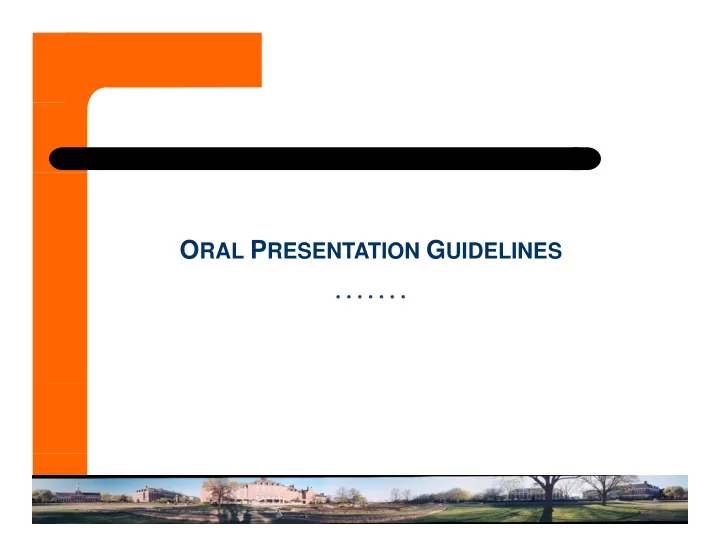

O RA P RESENTATION G UIDE INES O RAL P RESENTATION G UIDELINES
Some Principles � Oral Communication is different from written communication Listeners have one chance to hear your talk and can't "re-read" when they get confused. In many situations, they have or will hear several talks on the same day. Being clear is particularly important if the t lk th d B i l i ti l l i t t if th audience can't ask questions during the talk. There are two well- know ways to communicate your points effectively. The first is to K.I.S.S. (keep it simple stupid). Focus on getting one to three key ( p p p ) g g y points across. Think about how much you remember from a talk last week. Second, repeat key insights: tell them what you're going to tell them (Forecast), tell them, and tell them what you told them (Summary) (Summary). � Think about your audience Most audiences should be addressed in layers: some are experts in your sub-area some are experts in the general area and others your sub-area, some are experts in the general area, and others know little or nothing. Who is most important to you? Can you still leave others with something? For example, pitch the body to experts, but make the forecast and summary accessible to all.
� Think about your rhetorical goals For conference talks, for example, I recommend two rhetorical goals: leave your audience with a clear picture of the gist of your contribution, and make them want to read your paper. Your presentation should not replace your paper, but rather whet the audience appetite for it. Thus, it is commonly useful to allude to information in the paper that can't be covered allude to information in the paper that can t be covered adequately. � Practice in public It is hard distilling work down to 20 or 30 minutes. It is hard distilling work down to 20 or 30 minutes. � Prepare A hard work ahead…
How to Give a Bad Talk by David Patterson Thou shalt not be neat � Why waste research time preparing slides? Ignore spelling, grammar and legibility. Who cares what 50 people think? Thou shalt not waste space � Transparencies are expensive. If you can save five slides in each of four talks per year, you save $7.00/year! Thou shalt not covet brevity � Do you want to continue the stereotype that engineers can't write? Always use complete sentences, never just key words. If possible use whole paragraphs and read every word possible, use whole paragraphs and read every word. Thou shalt cover thy naked slides � You need the suspense! Overlays are too flashy. Th Thou shalt not write large h lt t it l � Be humble -- use a small font. Important people sit in front. Who cares about the riff-raff?
Thou shalt not use color � Flagrant use of color indicates uncareful research. It's also unfair to emphasize some words over others. Thou shalt not illustrate Thou shalt not illustrate � � Confucius says `` A picture = 10K words ,'' but Dijkstra says `` Pictures are for weak minds. '' Who are you going to believe? Wisdom from the ages or the person who first counted goto's? Thou shalt not make eye contact Thou shalt not make eye contact � � You should avert eyes to show respect. Blocking screen can also add mystery. Thou shalt not skip slides in a long talk � You prepared the slides; people came for your whole talk; so just talk You prepared the slides; people came for your whole talk; so just talk faster. Skip your summary and conclusions if necessary. Thou shalt not practice � Why waste research time practicing a talk? It could take several hours out of your two years of research How can you appear spontaneous if out of your two years of research. How can you appear spontaneous if you practice? If you do practice, argue with any suggestions you get and make sure your talk is longer than the time you have to present it.
Rule of Thumb simple slide design with big font sizes and less wordings � use graphics, picture, movie, table and charts as far as you can � justify use bullet to itemize the process b ll t t it i th � use a larger font size in mathematical equations as well � look at the audience (not your slides) � position you stand (watch out blind spot) position you stand (watch out blind spot) � � do not speak too fast (too much material to present) � figures should be incorporated into the wordings discussions (not � in separate pages, flipping) g g) answer questions pointly � typesetting all presentation materials (use graphics package and � equation editor) watch your language watch your language � time management � Not speak in monotone voice �
Recommend
More recommend